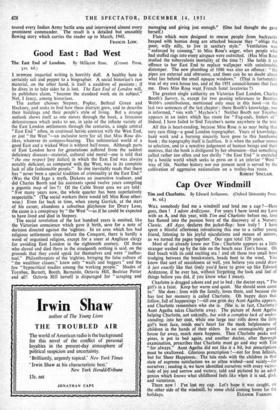Good East : Bad West
The East End of London. By Millicent Rose. (Cresset Press.
315. 6c1.)
I SUPPOSE impartial writing is horribly dull. A healthy hate is certainly salt and pepper to a biographer. A social historian's raw material, on the other hand, is itself a cauldron of passions ; if he dives in to take sides he is lost. The East End of London will, its publishers claim, " become the standard work on its subject." Not, I fancy, among historians. .
The author chooses Stepney, Poplar, Bethnal Green and Hackney, and seeks to find how these districts grew, and to describe their buildings and their people's style- of living. But a strange outlook shows itself as one moves through the book, a ferocious defensiveness which seeks to see, in spite of the infinite variety of the East London settlements ,through-the centuries, a single central "East End" ethos, in continual heroic contrast with the West End, or just "the West "—an inclusive term forall that Miss Rose dis- likes, whatever its compass-bearing. This unhistorical world of a good East and a wicked West is without half-tones. Although parts of East London have for „generations suffered from the saddest deficiency diseases—material, cultural and moral—one is told that "the one respect Imy italics] in which the East End was always notably deficient,-as compared with the West, was in its complete lack of idle fashionable people." So one inevitably reads that there has "never been a special tradition of criminality at the East End." (Was the Old Jago a myth, Dickens an insensitive traducer, and did Charles Booth and his assistants spend twelve years compiling a gigantic map of lies ?) Of the Cable Street area we are told: "For many years now, the whole quarter has been superlatively respectable." (Th,e social workers there would tell Miss Rose other- wise.) Even far back in time, when young Garrick, at the start of his career, abandons a suburban pliyhouse for Drury Lane, the cause is a conspiracy by "the West "—as if he could be expected to have lived and died in Stepney. The social revolution of th,e last hundred years is omitted, like V Victorian conscience which gave it birth, save for a note of derision directed against the 'eighties. In an area which has had religious settlements since before the Conquest, there is hardly a word V of organised religion, except for a sneer at Anglican clergy for avoiding East London in the eighteenth century. Of those who slaved and died there in the nineteenth nothing is said, on the grounds that they could speak for themselves and were "ineffec- tual." Philanthropists of the 'eighties, bringing the false culture of "the wealthier classes," knew only "waifs and beggars" and the few "hypocritical toadies among the working people." Shades of Toynbee, Barnett, Booth, 13arnardo, Octavia Hill, Beatrice Potter and an Octavia Hill herself is disparaged for "scraping 'and
managing and giving just enough." (One had thought she gave herself.) Flats which were designed to rescue people from backyards heaped with human dung are attacked because they "oblige the poor, willy nilly, to live in sanitary style." Ventilation was
enforced by cunning," to Miss Rose's anger, when people who had stuffed rags into every airspace were outwitted. (Has Miss Rose studied the tuberculosis mortality, of the time ?) She holds it an offence to her East End to replace wallpaper with uninfestable distemper. The new plumbing of 1886 was also an offence: "the pipes are external and obtrusive, and there can be no doubt about what lies behind the small opaque windows." (That is fortunately true of my own house too, and of the 1951 council-houses that face me. Does Miss Rose want French hotel lavatories ?) The greatest single authority on Victorian East London, Charles Booth's Survey, is, except for two passing 'references to Beatrice Webb's contributions, mentioned only once in this book—in the last two sentences of the last chapter •' there Booth's knowledge, one is informed, "vies with" Mayhew's ! Neither Booth nor Toynbee appears in an index which has room for "Fag-ends, finders of." Indeed, I have failed to 'find TOynbee's name anywhere in the text.
All this is heart-rending, because Miss Rose is so near being that very rare thing—a good London topographer. Years of knowledge, hard work and a burning sincerity have gone to this handsome book; the topography itself is faultless. It is when the author comes to selection, and to a sensitive judgement of human beings and their motives, that the book is disfigured by her obsession—that something called rather too often and too shrilly "the East End" is encircled bY a hostile world which seeks to press on it an inferior " West " way of life. Neither history nor our present need is served by the cultivation of aggressive nationalism on a trolley-bus route.
ROBERT SINCLAIR.






































 Previous page
Previous page